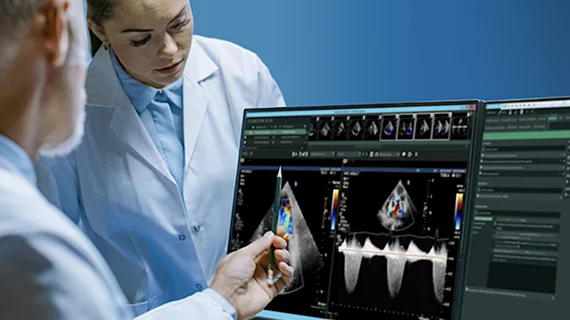Best of KLAS 2022: The top cardiovascular information systems and hemodynamic solutions
KLAS Research, a healthcare information technology market research firm, has released its 2022 Best in KLAS report, including sections on cardiovascular information systems (CVIS) and hemodynamic systems.
KLAS reports try to find the true story of what is happening with every vendor solution by interviewing clinicians who are the product end users. KLAS said the report is not a perfect sample size and does not include all vendors, but offers hospitals a much larger group of references than a traditional reference check of a couple customers from a vendor’s reference list. The research allows providers and payers to hear frank comments from install sites. The Best in KLAS report covers more than 1,000 health informatics solutions used across health systems.
Rankings of cardiology information systems (CVIS)
In the category of CVIS, clinicians ranked Fujifilm Synapse Cardiovascular Best in KLAS with an overall ranking of 83.6 out of a possible 100 points. This included high marks from end users for culture, loyalty, operations, product, relationship and value. KLAS said Fujifilm's approval rating increased 13% from its 2021 numbers.
The overall performance ranking scores of the CVIS vendors included in the report were:
• Fujifilm Synapse Cardiovascular, 83.6
• Siemens Healthineers syngo Dynamics, 79.7
• IBM Watson Health Merge Cardio, 78.6
• Change Health Healthcare Cardiology Solutions, 77.5,
• Philips IntelliSpace Cardiovascular, 73.4
• GE Healthcare Centricity Cardiology Enterprise Solution, 65.4
While these companies generally stayed around the score they had from last year, KLAS said GE dropped 20% in its ranking from its 2021 score. This included a grade of D for culture and loyalty and an F for value.
KLAS also included four other CVIS companies in the report, but these were not ranked with the other six above because there was limited data to make apples-to-apples comparisons. These companies and their overall performance score included:
• Infinitt Cardiology Suite, 87.1
• Epic Cupid, 86
• Intelerad Apollo Advance (Lumedx), 77.2
• Intelerad DigiView (Digisonics), 74.9
Epic Cupid is integrated into the Epic electronic medical record (EMR) and used for basic cardiology information at many Epic install hospitals. However, complaints from cardiology departments is that if lacks the depth required for detailed cardiology reports. For this reason, many hospitals use a third-party CVIS software that will integrate with Epic for more advanced tool sets and reporting.
KLAS noted that none of the clinicians interviewed for CVIS reviews said their vendors were able to keep all the promises made during contract negotiations. Another complaint was that all vendors will charge for every little things they do on the system. While Siemens and Fujifilm both ranked above 95% by respondents for being included in long-term plans, none of the hospitals were above 95% certain they would buy from the same vendor again.
CVIS trends observed in 2021
In the KLAS Cardiology 2021 Opportunity for Market Disruption Decision Insights Report, there were five key trends observed in hospital interviews conducted last year. These include:
1. Philips, IBM Watson Health and Fujifilm were the vendors most often considered by health systems looking for a new CVIS in 2021.
2. Agfa HealthCare, GE Healthcare and Change Healthcare saw less momentum.
3. Philips, Epic and IBM Watson Health were selected for purchase by large healthcare organizations.
4. Integration, functionality and cardiologist preference were primary drivers for why a CVIS was selected.
5. When considered a new or replacement CVIS, Epic and ScImage were often selected, but usually in combination with other vendors.
Rankings for cardiology hemodynamic systems
Hemodynamic systems are used to record patient vital signs and other physiological and procedural data during interventional procedures. The four vendors included mentioned in the 2022 interviews were all within 10 points of each other in their ranking scores:
• GE Healthcare Mac-Lab, 84
• IBM Watson Health Merge Hemo, 83.4
• Philips Xper Hemodynamics, 77.3
• Change Healthcare Cardiology Hemo, 73.3
GE's Mac-Lab rose 6% from its ranking in 2021. IBM and Philips rose a couple points as well. Change Healthcare decreased 2% and had a D grade for valve. However, Change Healthcare said it will soon be retiring its current hemo system that was developed by McKesson close to a decade ago. The vendor said it hoped to launch its new hemodynamic system platform in 2022.
Both IBM Watson and Philips were said to be included in long-term plans at the hospitals where they are installed.

